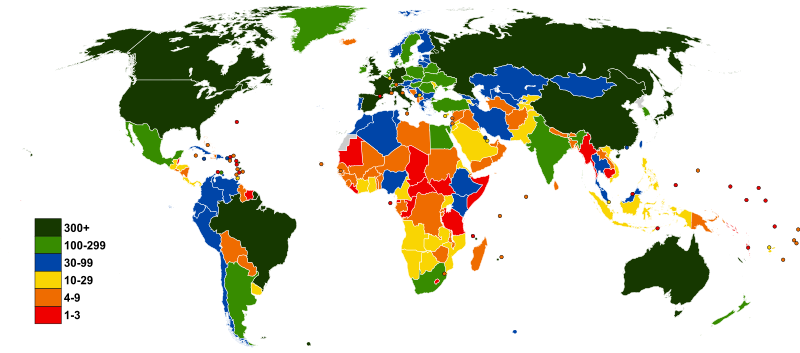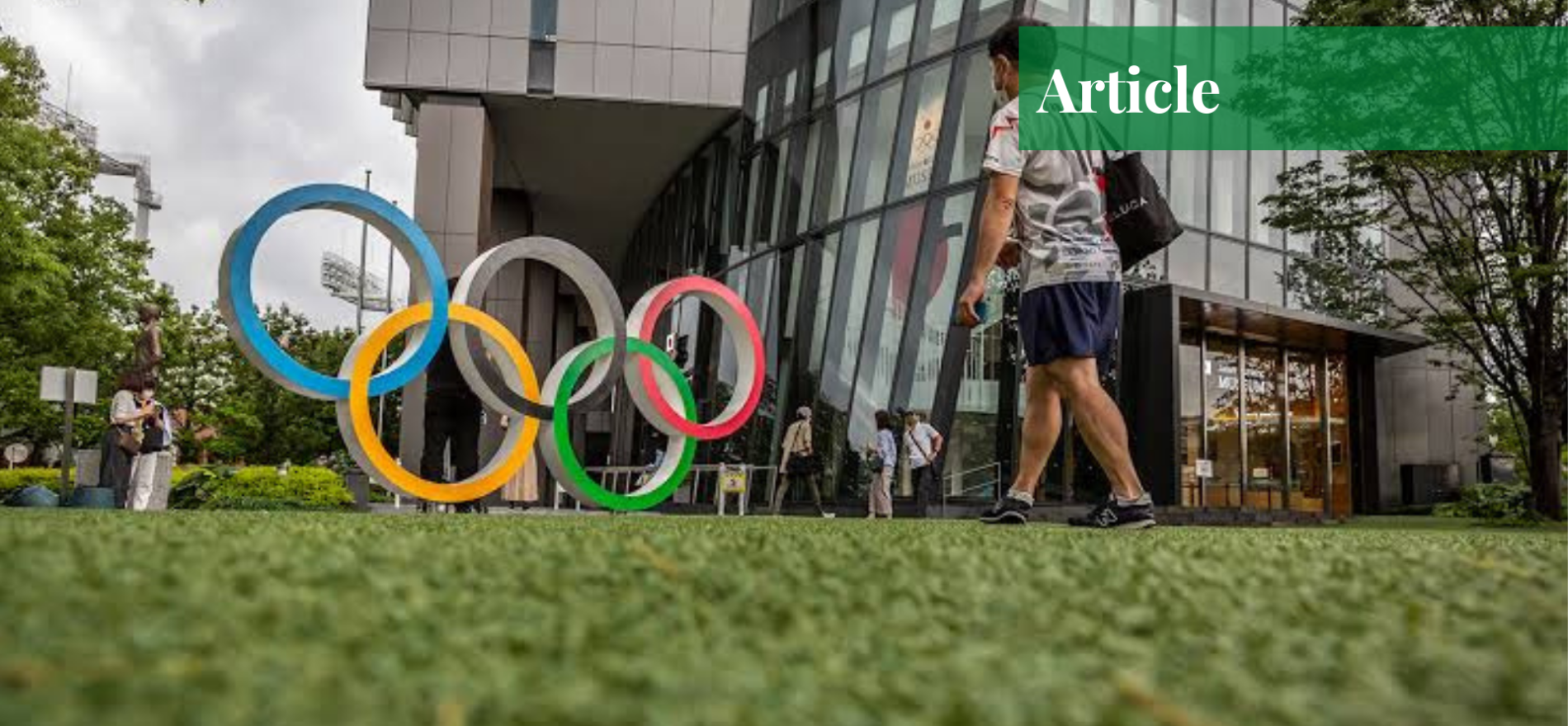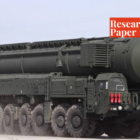Ms Mahnoor Nafees is a student of BS International Relations at the University of Management and Technology.
The 2020 Summer Olympics
Due to the Covid-19 pandemic, the Summer Olympics in 2020 had to be delayed. After a year, the 2020 Summer Olympics are finally being held with their hallmark zeal and fervor in Tokyo, Japan in 2021. Starting from 23rd July, the event will continue till the 8th of August, with more than 11 thousand athletes participating from 206 countries. To participate in the Olympics, Pakistan has also sent 10 athletes to Tokyo.

Though the pandemic still poses threats to the well-being of the athletes, organizers, and audiences, the Summer Olympics in 2020 (technically held in 2021) still continue with strict restrictions and precautions. From the inception of the Olympic Games in 1896 till today, the Olympics have undergone enormous changes.
At first, the games included were limited in number and did not have the conception of a winter series. However, as the number of games, participating athletes, and states increased, the Winter Olympics were introduced in 1924. The evolution still continues as the ongoing Tokyo Olympics have also included five new sports including baseball and karate.
Major Powers and the Olympics
At the beginning of the Olympics, in 1986, only 13 countries participated. Whereas the number has now risen to 206. However, even with this significant increase in the number of participating countries, the winning ratio is still tilted towards the major powers that have been competing since the beginning.
For example, the US has won the most gold medals since 1896 and also has the highest number of athletes in the Tokyo Olympics 2020. After the US, Britain, France, and Germany are next in line for holding the most gold medals. This is primarily due to the fact that these major powers have been competing in the games for a long time. They have acquired the skills and experience needed to compete in the international arena.
Moreover, due to the technological and scientific advancements, these states have introduced ways for extensive training and practice which many other states lack. Still, due to the evolving nature of the event, newer games and sports allow low population and smaller states to grab a position for themselves and make their names known to the world.
The United States of America
The USA currently holds a total of 1,022 gold medals in the Summer Olympics. With a huge difference, the second in line was the Soviet Union with 440 gold medals. A major portion of these successes can be attributed to the huge population which provides a large pool to search for talented and skilled athletes and sportsmen.
A culture promoting sports and games, and efficient and advanced training mechanisms have also played a role in securing wins. The US particularly specializes in an athletic group that has earned it 802 medals altogether. Basketball is another game that it reigned over till now, but the increasing competition is making it harder for the US to maintain its lead. In the ongoing event, the United States’ men’s basketball team has lost its first Olympics since 2004, leaving fans in shock.
Though the US is one of the three countries which do not provide any financial support to its Olympics athletes, it has still managed to maintain its lead thanks to corporate sponsors. The culture of sports, and the massive inclination towards them, allows athletes to become brand ambassadors. Another major source of finance for US athletes is income from television broadcasting rights and commercial advertisements.
China
Unlike America, China specializes in table tennis. With one of the finest table tennis players in the world, China even exports its players. China has bagged 28 out of 32 gold medals in the game till date. Besides table tennis, China has also made its mark in badminton, gymnastics, diving, and shooting and has grabbed 12 gold medals in 5 days of the Summer Olympics in 2020. Furthermore, China has outperformed its predicted medal total and surpassed the 2016 medal total of Russia in the ongoing Olympics.
China’s goal to dominate international sports competitions is a part of Xi Jinping’s Chinese dream. President Xi has clearly mentioned that he wants the Chinese sports industry to grow to a worth of 850 billion dollars by the year 2025. The Chinese excitement to host the Winter Olympics in 2022 also showcases its determination to strengthen its sports industry.
In the backdrop of the ongoing US-China rift, the Tokyo Olympics have provided the opportunity for healthy competition to both US and China to consolidate their international prestige. The growing nationalism and societal inclination towards sports have helped China achieve excellence; rigorous training with advanced equipment has also played a major part in paving the way towards victory.
Japan
Japan, the host country of the Summer Olympics in 2020, is performing exceptionally well. As of 28th July, Japan leads the gold medal count with 13 gold medals to its credit whereas, the US is placed third with 11 gold medals. Japan has heavily dominated the sport of judo. Since the inclusion of judo in the Olympics in 1964, Japan has grabbed a gold medal in almost every event. With 84 gold medals to its credit, Japan leads the game in the international arena.
Japan has gradually increased its sports budget from 22.79 billion yen in 2011 to 35.38 billion yen in 2021, resulting in an increase in the competitiveness of its athletes. Moreover, a Sports Promotion Fund was created in 1990 to promote sports culture among the youngsters and provide sufficient training facilities. The state’s support and efficient policies have allowed Japan to make its mark in international sports competitions.
A visible similarity among the leaders of international sports competitions is their exceptionally advanced training. The focus on building their international prestige through soft powers, like sports and games, has allowed these states to excel. Additionally, states’ focus on building sportsmanship and provision of adequate facilities has eased the journey towards excellence.
Pakistan at the Tokyo Olympics 2020
Pakistan has participated in the Tokyo Olympics but yet again has disappointed its fans by sending a small contingent. The contingent consists of 20 members, of which 10 are athletes and 10 officials. Though there is a slight increase from 2016 in the number of athletes, the situation is still devastating.
Pakistan’s worst performance to date has been in Olympics 2016. It was a catastrophic moment for the country’s sports community that no national athlete could qualify for the Olympics and the seven participants were given a wild card entry. More disappointing was the fact that the country which had maintained a strong position in field hockey, had won 3 gold medals, and stayed in the top 4 for 20 to 30 years, was not even able to qualify for participation for two consecutive events. The Summer Olympics in 2020 is the second time when Pakistan’s hockey team is not part of the contingent for Tokyo.
In the ongoing event, Pakistan has participated in badminton, swimming, shooting, weightlifting, and athletics. As the event continues, the participants have shown exceptional performances despite limited training facilities and finances. The closest Pakistan has been to winning a gold medal, after ages, was when Talha Talib, hailing from Gujranwala, held the gold medalist spot for weightlifting until he was finally ousted by another participant. Talha’s efforts were celebrated by the whole nation; despite his limited training and approach, he took Pakistan closer to a gold medal.
Pakistan Deficiencies
The decline of sports in Pakistan can be attributed to a number of reasons. Mainly it is because of the government’s inadequate focus and massive corruption in the state departments. Pakistan has one of the lowest budgets allocated for sports in South Asia, even less than Afghanistan. Furthermore, the prevalent corruption in departments does not allow even this small budget to be used efficiently, leading it to be detrimental to players and sports culture.
Additionally, the deplorable conditions of the grounds, gyms, and other training facilities have added to the disappointment of locals, the vast majority of whom have distanced themselves from sports and its culture. This has resulted in a decline in the valor, motivation, and sportsmanship of youngsters. Moreover, the extensive importance given to cricket has diverted attention from other sports which need adequate funds and resources to flourish.
Furthermore, being a developing country, Pakistan does not have the financial resources to provide its athletes with modern training and coaching without which participating in the Olympics and maintaining its international standing would be difficult. Without adopting advanced training and coaching methodologies and modern equipment, Pakistan would not be able to improve its participation in the Olympics.
Conclusion
Pakistan has remained one of the high achievers in international sports tournaments for the most part of its history. The continuous decline in the performance of Pakistan in international competitions, particularly in the Olympics, has disappointed people to such an extent that there is little hope left for revival. Reviving the sportsmanship in people and reintroducing the sports culture will not only benefit to uplift our international standing but can also provide economic benefits. Strict and timely actions are needed to bring Pakistan back on a winning trajectory. However, in the current circumstances of social and political instability, it seems that sports will remain a neglected department.
If you want to submit your articles and/or research papers, please check the Submissions page.
The views and opinions expressed in this article/paper are the author’s own and do not necessarily reflect the editorial position of Paradigm Shift.


















